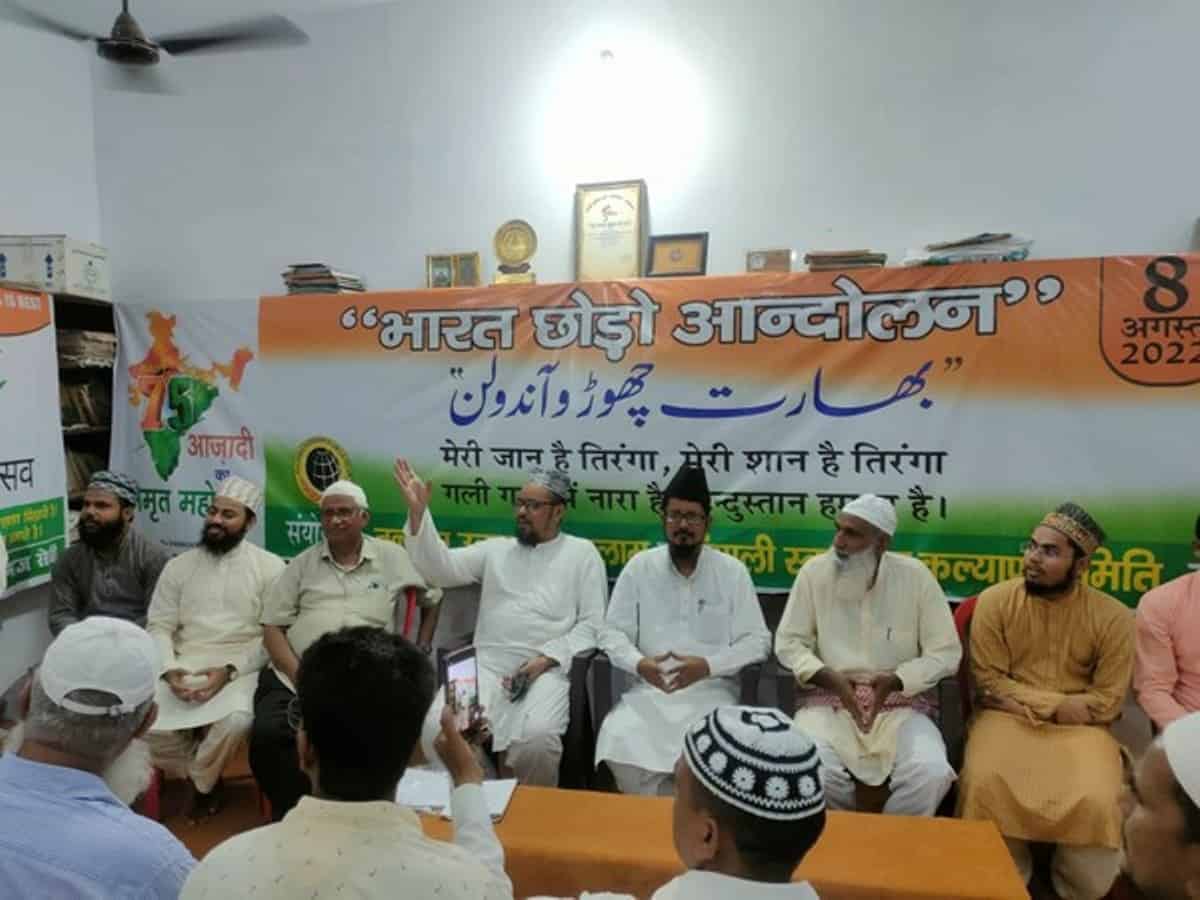
Bareilly: All India Tanzeem Ulama-e-Islam organized a big programme on Monday on the anniversary of the Quit India Movement, where Maulana Shahabuddin Razvi, Secretary General of the Tanzeem, recounted the importance and history of the Quit India Movement.
Razvi said that both Hindus and Muslims together liberated India and sent the British across the seven seas, now again the people of both communities will work together for the progress and prosperity of India and will take India to new heights.
Razvi said that Mohandas Karamchand Gandhi started the ‘Quit India’ movement on August 8, 1942, at the All India Congress Committee session in Bombay.
The next day, Gandhi, Nehru and several other leaders of the Indian National Congress were arrested by the British government. In the following days, there were disorderly and non-violent demonstrations across the country, he added.
By mid-1942, Japanese troops were approaching India’s borders. There was increasing pressure from China, the United States and Britain to resolve the issue of India’s future status before the end of the war, he stated.
Further, he said, in March 1942, the Prime Minister sent Sir Stafford Cripps, a member of the War Cabinet, to India to discuss the draft declaration of the British government.
The draft gave India Dominion status after the war but otherwise accepted some changes in the British Government Act 1935. The draft was unacceptable to the Congress Working Committee which rejected it. The failure of the Cripps Mission further alienated Congress and the British Government.
Gandhi captured the failure of the Cripps Mission, the progress of the Japanese in South-East Asia, and the general frustration with the British in India. He called for a voluntary British withdrawal from India. From 29 April to 1 May 1942, the All India Congress Committee gathered in Allahabad to discuss the proposal of the Working Committee.
Although Gandhi was absent from the meeting, several of his points were included in the resolution, the most important of them being a commitment to non-violence. On 14 July 1942, the Congress Working Committee met again at Wardha and resolved that it would authorize Gandhi to take charge of the non-violent mass movement. The resolution, commonly referred to as the ‘Quit India’ motion, was to be approved by the All India Congress Committee meeting in Bombay in August.
From August 7-8 1942, the All India Congress Committee met in Bombay and ratified the ‘Quit India’ resolution. Gandhi called for ‘do or die’. The next day on 9 August 1942, Gandhi, members of the Congress Working Committee and other Congress leaders were arrested by the British Government under the Defense of India Rules.
The Working Committee, the All India Congress Committee and the four Provincial Congress Committees were declared unlawful associations under the Criminal Law Amendment Act of 1908. The assembly of public meetings was prohibited under Rule 56 of the Defense of India Rules.
The arrest of Gandhi and Congress leaders led to massive demonstrations across India. Thousands were killed and injured in the wake of the ‘Quit India’ movement. The strike was called in many places. The British swiftly suppressed many of these demonstrations by mass detention; More than 100,000 people were imprisoned.
The ‘Quit India’ movement, more than anything, united the Indian people against British rule. Although most of the demonstrations were suppressed by 1944, after his release in 1944, Gandhi continued his resistance and went on a 21-day fast. By the end of World War II, Britain’s place in the world had changed dramatically and demands for independence could no longer be ignored.
Mufti Sirajuddin Qadri, Maulana Sheeb Raza, Maulana Dilkash, Maulana Salim Razvi, Maulana Idris Noori delivered speeches. Renowned social worker Haji Nazim Baig conducted the programme. Mainly Israel Khan Pradhan, Salim Khan, Zarif Gaddi, Mahtab Mian, Khalil Qadri, Mohsin Khan, Sabir Ali, Ibrahim Sheikh, Tayyab Ali, Absar Ahmed etc. Hundreds of people were present. The program ended on the ‘dua’ of Mufti Salim Noori Barelvi.



